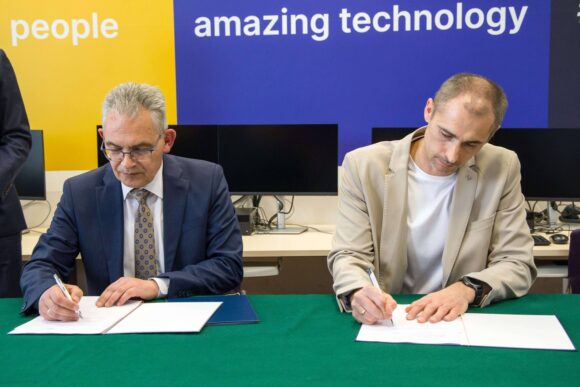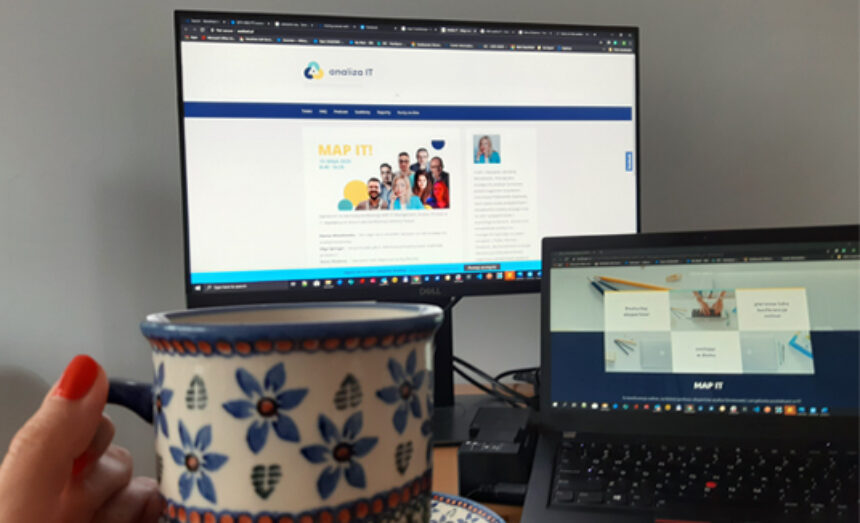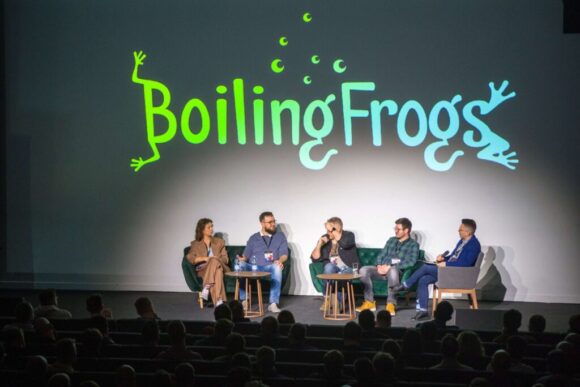
Development in the time of pandemic through the eyes of an analyst

At Metapack, we support our employees in their development. We also give a lot of freedom in choosing its direction and sources of knowledge. These rules work great, even though it sometimes requires some flexibility.
Because what to do when a team of several analysts asks for a day off from tasks for a full-day webinar? There is nothing else to do but say ‘yes’. See what our team learned at the “MapIT – Management, Analysis, Product” conference and how you can maintain access to knowledge even in Home Office mode.
Analysts have requirements
On a daily basis, we use “agile” methods, popular in the IT industry. They allow us to work on projects in a flexible and continuous manner. However, it requires a certain self-discipline, as well as a constant search for solutions that will improve and optimize our processes. So when Bartek, one of our analysts, found out about the MapIT conference, he quickly mobilized the entire team to participate. Not only the subject matter of individual speeches was important to them, but also other aspects.
'The free webinars I participated in so far, which grew like mushrooms during the quarantine period, gave disproportionately little knowledge in relation to the large amount of marketing, prompting participants to sign up for a paid course. I had the impression that this type of webinars were a way of winding up the sales machine and a bit of a waste of time.'
Marta
So the expectations of the Metapackers were high, and what convinced them to watch this conference? Let’s take a look at the MapIT event itself.
MapIT Conference – Management, Analysis, Product
The conference was held on May 15 and it was free for all participants. As many as 1,200 people from the industry registered for it, and – according to reports from our team – at its peak, the speakers were watched by 800 participants.
No wonder, a program rich in speeches tailored to the expectations of people related to business or systems analysis, IT project and product management encouraged to take part in it. The agenda included topics related to prioritizing tasks, setting goals or organizing the Product Owner’s work. There were also more catchy titles. Jarosław Łojewski talked about “failure”, or how to learn from failures. Michał Bartyzel raised the problem of agile methods and the related traps.
Learning in Home Office mode
So at 9:00 am our Metapackers sat down to watch the conference together. As we have not returned to the office yet, the training was conducted online. How did it go? It turned out that the team was well prepared.
'We exchanged views on our system-analysts slack channel on an ongoing basis. It's great that I didn't take part in it alone, but with the rest of the Analysts.'
Patrycja
Viewing, commenting on current information and exchanging experiences made Metapackers feel as if they were taking part in a ‘live’ event. They could also analyze problems together and make decisions about what to implement from this conference in their daily work. They also used conversations on the channel to exchange book collections.
'It turned out that we have some of the recommended books in our own book collections and we plan to exchange them between each other as soon as possible.'
Kinga
Was it worth it?
As it turned out – the webinar was very valuable. Although it was not a typical training session, the Metapackers pulled out a handful of information for further study and inspiration.
'The webinar was interesting as experienced people shared with us valuable experience in the field of their work, in the field of IT analysis, presented their point of view and approach to work on various analytical levels. Personally, my plan is to delve into details and use other sources of knowledge that the lecturers have recommended, for example, to read books and their studies.'
Malwina
Metapackers also appreciated the organization of the event, which in the current situation is a challenge.
'Great organization of a free conference. I was surprised not only by the professionalism in technical preparation, but above all, by the injection of the substantive knowledge.'
Marta
As it turned out, the MapIT conference not only broadened and directed the knowledge of Metapackers. Thanks to it, some also increased their sympathy towards their colleagues:
'I have an even more empathetic approach to the Product Owner after the webinar, because it was about the difficulties that PO faces, presented in a rather emotional way.'
Patrycja
Wojtek was intrigued by a completely different topic, namely the Analyst’s profession itself. As it turns out, the requirements for employees in this position are varied, and skills such as programming or directional education may be less important than, for example, knowledge of English. This is not the only curiosity about the profession of Systems Analyst in Poland.
'As it turns out, the discrepancies in the tasks of Analysts and the requirements for them from the teams are not specific to our company. It seems that the profession of an Analyst is still a little bit of an unrecognized land - an adventure where you never know what will happen to you. And thus, a good approach and openness to the world are very important, they can give much more than just knowing the theory.'
Wojtek
Inspiration for further search
Although our analysts liked the content of the conference, they admitted that the topics discussed on MapIT require a little more digging.
'The webinar covered many different topics in a way that encouraged further research and learning.'
Kinga
There were also issues that intrigued our Metapackers enough to try to implement changes in their daily work.
Wojtek became interested, for example, in the method, which helps to draw conclusions from failures. It takes place according to the following stages:
- Identify failure.
- Understand what came out of it.
- Plan preventive and corrective actions.
- Carry out these actions.
- Verify the applicability and usability of actions.
This was not the only issue that intrigued our Analyst.
'Application of quantitative methods in the context of the Product Roadmap - I assumed that quantitative methods are used at higher levels of analysis. Now it seems quite logical to me.'
Wojtek
Marta was interested in Elena Zhukova’s speech about creating OKR (Objectives & Key Results). Although she knew this method, the lecture gave Marta a lot of food for thought and – as she emphasizes – willingness to act. Is she planning to implement it in everyday work?
'I already have. In my opinion, the OKR method is a great addition to the Product Roadmap that we use in Metapack. Operating with goals, key results that we want to achieve, gives the effectiveness in dividing the Roadmap and the whole Big Picture into prime factors, builds greater awareness in the entire team. Regular 'inspect' and 'adapt' - change, adjustment - gives the Analyst the opportunity to provide strategic support for the Product Owner, and this is a good way to an ideal marriage.'
Marta
Patrycja also learned a specific lesson from the webinar.
'There was, among others, the discussed method, which is to focus attention on the value and goal that we must achieve - in the vortex of work, the goal of the project is often forgotten because we are focused on the greater things we are doing at the moment. And you have to remember what we're doing these great things for. Otherwise, it's easy to let your imagination run wild and do too many great things or do great things that don't give you the value you want.'
Patrycja
Similar conclusions allow us to believe that online conferences and webinars, which are not trainings, but mainly an inspiration or direction for Metapackers, make sense. We are particularly pleased with the preparation of the team for the event and the approach to the acquired knowledge, which will certainly pay off in their development and in the work of our entire company.
We always give green light to such initiatives!
